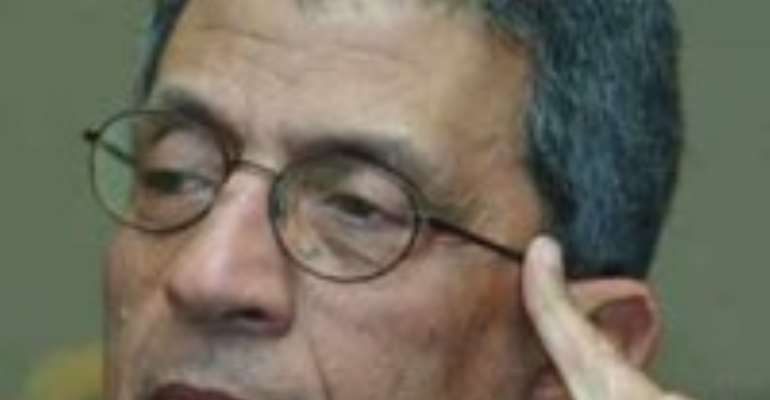TUNISIA'S CRISIS IS WARNING TO ARAB, M'EAST LEADERS, SAYS MOUSA

IN an impassioned remark, the Secretary General of the Arab League, Amr Moussa, yesterday told an Arab economic summit in Egypt that 'the Arab soul is broken by poverty, unemployment and general recession.'
This warning is coming as hundreds of protesters marched down a main boulevard of Tunisia's capital yesterday, demanding that allies of the ousted President Zine El Abidine Ben Ali must stop clinging to power.
Weeks of protests fueled by joblessness and other economic woes in Tunisia ousted President Zine El Abidine Ben Ali last Friday after 23 years in power, and the caretaker government run by his longtime prime minister is now struggling to calm tensions.
The new interim government, already hobbled by defections, held its first Cabinet meeting yesterday afternoon.
The unrest has helped inspire similar protests around the Arab world and calls for political change, though activists face the reality of vast security forces heavily vested in the status quo backing hard-line regimes ready to crack down on dissent.
Hence Moussa was quoted by Associated Press (AP) in opening address to the 20 Arab leaders and other representatives of Arab League members who gathered in the Red Sea resort of Sharm el-Sheikh that 'the Tunisian revolution is not far from us.'
According to him, 'The Arab citizen has entered an unprecedented state of anger and frustration,' calling for an Arab renaissance to lift people from their frustration.
The meeting in Egypt had been intended as a platform to discuss trade, business and investment, but was overshadowed by the events in Tunisia and their reverberation around the region.
Mindful of those events, the AP reported that Arab leaders at the summit committed to a proposed $2 billion programme to boost faltering economies that have propelled crowds into the streets to protest high unemployment, rising prices and rampant corruption.
Thousands have demonstrated in Jordan, Egypt, Oman, Libya and Yemen recently over the economic situation, some explicitly in solidarity with the Tunisians.
Kuwaiti ruler, Sheik Sabah al-Ahmed al-Jaber al-Sabah, said the fund will 'contribute to creating new job opportunities for young Arabs' at a time when the Arab world is witnessing 'unprecedented historical crisis.'
The idea of the fund was first suggested by Kuwait during the economic summit in the Gulf emirate in 2009 but has been slow to get off the ground like many Arab League initiatives requiring members to pledge money.
Arab diplomats said oil-rich Saudi Arabia and Kuwait have promised to pay $500 million each and, after the economic-related unrest in Tunisia, additional pledges are pouring in.
Egypt's President Hosni Mubarak stressed the importance of economic cooperation, tagging it 'a national security' requirement.
The 82-year-old president, who chaired the summit, also said investment in the Arab youth will bring future rewards.
'The most precious of all our resources and wealth,' Mubarak called them. 'The issue of employment will remain at the top of all challenges.'
Saudi commentator, Turki al-Dakhail, writing in the al-Watan daily, called for the Arab regimes to end the 'starvation' of their nations.
'The systematic starvation against people in Tunisia led to an uprising and anger of the people,' al-Dakhail wrote. 'Starving your dog, will force him to eat you up,' he added.
Meanwhile, the fragile state of the government has highlights Tunisians' questions about who is in control of this North Africa nation on the Mediterranean Sea, popular among European tourists and seen as an ally in the West's fight against terrorism.
The government has reduced the hours of an overnight curfew put in place last week 'in the wake of an improvement in the security situation in the country,' the official news agency TAP reported. The hours will now be 8 p.m. to 5 a.m., from 6 p.m. to 7 a.m. previously.
In the latest protest in Tunis yesterday, demonstrators sang nationalist songs and held up signs with 'RCD Out!' - referring to the former ruling party - as they walked down Avenue Bourguiba in central Tunis, as white-and-blue police vans lined the route.
'We want the old government out - and we want them away from anything that has to do with the government,' said Hafed al Maki, 50, who works at the country's largest insurance company. He said he and colleagues staged a strike and overthrew their manager on Tuesday.
He said he would not wait for the 60-day time limit for new presidential elections 'because that is enough time for the old cronies to set their roots in and start their old ways again, thieving and taking our resources. No way that's happening again.'
However, the interim government under Prime Minister Mohamed Ghannouchi was already hobbled: On Tuesday, four ministers resigned within 24 hours after being appointed to the unprecedented multiparty Cabinet.
An airport official said the Tunisian foreign minister, Kamal Merjan, left the Egyptian resort town of Sharm el-Sheik yesterday before the start of an Arab League summit, without giving any reason.
The unrest has also rattled Tunisia's economy, which has seen impressive growth in recent years. Moody's Investor Service downgraded Tunisia's government bond ratings yesterday, citing 'significant uncertainties' surrounding Tunisia's economic and political future.
